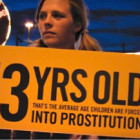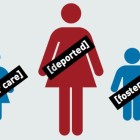
State Laws Fail to Protect Children from Sex Trafficking
|
Most states aren’t doing enough to curb child sex trafficking according to a new report by the advocacy group Shared Hope International. The study, prepared in partnership with the American Center for Law and Justice, graded all 50 states on the strength of their sex trafficking laws. States that protected minors and prosecuted traffickers received the highest grades. But more than half of states received grades of D or F.
Leading the states with grades of B were Texas, Missouri, Illinois and Washington. All received high marks for criminal provisions addressing demand and protective provisions for child victims.
Georgia ranked near the top as one of only six states receiving a C because of its comprehensive human trafficking law and laws combating commercial exploitation of children.








